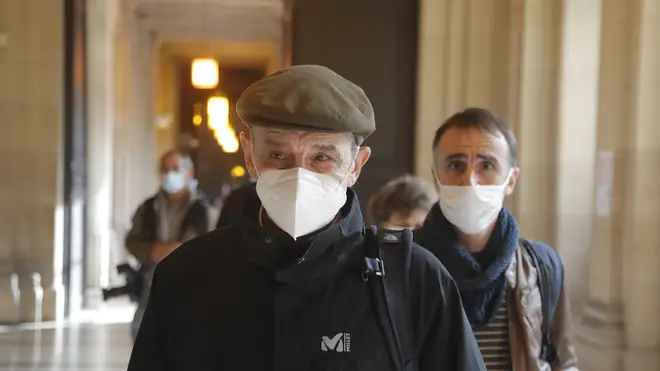
Tom Swarbrick 4pm - 7pm
19 October 2020, 16:54

Key defence witnesses could not make it to the trial.
The last known chief of the militant Basque separatist group ETA has had the first of two back-to-back trials on terrorism charges postponed.
Josu Urrutikoetxea deems the charges “absurd” because of his role in ending a conflict that claimed hundreds of lives in Spain over half a century.
He led ETA during one of its bloodiest periods, when its victims included children killed while they slept after a bombing at a Zaragoza police compound in 1987.
He was set to face justice in Paris this week, following two sentences for a total of 15 years in prison for his alleged role in attack plots in the 2000s and 2010s respectively that he appealed when he was arrested.

But the judge on the earlier case postponed the trial to February 22 and 23 next year because some of the key defence witnesses could not make it to Monday’s hearing due to the coronavirus pandemic.
In a rare interview after 17 years on the run, Urrutikoetxea offered an apology, advised other separatist movements against resorting to violence, and painted himself as a changed man.
ETA’s violence caused around 850 deaths and thousands of injuries, and hijacked the Basque and Spanish political debate for decades.
Those who lost loved ones say that just because Urrutikoetxea oversaw ETA’s end in 2018, that does not erase his past.
Now 69, diminished by a battle with cancer and facing the prospect of life behind bars, the man widely known by his police alias Josu Ternera says he is sorry for “irreparable damage” caused by ETA violence as it sought to build an independent state straddling the Pyrenees mountain range between Spain and France.

Asked if he would apologise to ETA victims’ families, he told The Associated Press: “Of course, (I offer) apologies for something that we can’t repair.”
But he insisted the Basque independence movement suffered, too, from violence rooted in the Spanish dictatorship under Franco that ended more than four decades ago.
“The Basque country was entering into a black hole” of cultural repression, he said, “and we had to do the maximum to pull it out”.
Some of ETA’s victims said they want more than apologies from Urrutikoetxea; they want him to face justice.
“I don’t seek revenge against Josu Ternera,” said Lucia Ruiz, who was 10 years old when she was injured in the 1987 blast targeting military police barracks in Zaragoza where she lived. “But this gentleman tried to kill me and I want for him to pay a price for it.”

Since his arrest last year, Urrutikoetxea has campaigned to shed the terrorist label and rebrand himself as a repentant, aging peacemaker.
He won conditional release in July pending trial, after lawyers argued poor health made him vulnerable to contracting coronavirus.
He is now staying with a friend in Paris, where he is trying to get a college diploma and is allowed out a few hours a day with an electronic bracelet.
In a petition published Saturday, more than 250 intellectuals from multiple countries called for France and Spain to end Urrutikoetxea’s prosecution, arguing that putting him on trial “is implicitly criminalising all negotiators and calling into question all current and future peace processes in the world”.
Those calls are rejected by most of Spain’s political mainstream.

Ruiz and Spanish authorities believe that Urrutikoetxea, as ETA’s leader, either approved or knew about the car that, loaded with dynamite, exploded under her window at the Zaragoza Civil Guard headquarters where she lived with her father, mother and sister.
Three ETA assailants were tried and imprisoned for carrying out the attack, which killed 11 people, including six minors.
“He now presents himself as the country’s saviour,” Ms Ruiz said. “But this gentleman is a murderer, with murder written in capital letters.”
Urrutikoetxea denies any role, saying, “They want me to answer for something I had nothing to do with.”
He led ETA in the late 1980s, was arrested in 1989 and spent the next 11 years behind bars in France and Spain.
As ETA’s violent methods lost sway, Urrutikoetxea served as a legislator in the Basque regional parliament and a negotiator in talks with Spanish envoys to try to end the group’s activities.
ETA gave up its arms in 2017, and Urrutikoetxea read the statement announcing ETA’s final dismantling in an audio recording released on May 3 2018.
Indicted for his alleged role in the Zaragoza attack while he was on a parliamentary visit to Switzerland in 2002, he was Spain’s most-wanted fugitive until his arrest outside a hospital in the French Alps in May 2019.